Victims of Glenanne gang 'believe they will see justice'
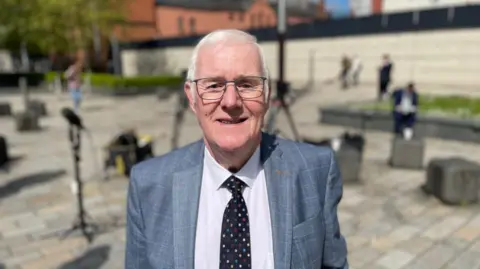 BBC
BBCFamily members of victims of the Ulster Volunteer Force (UVF) Glenanne gang have said they are growing in confidence that they will finally see justice.
At the High Court in Belfast on Thursday, Mr Justice Rooney listed several of their civil cases to be reviewed next month.
Eugene Reavey's three brothers Anthony, John Martin and Brian were shot dead in an attack at their family home in Whitecross in January 1976.
Speaking outside court he said he finally felt positive about his brothers' case.
'Signal to the state'
"It's about the first time that I've been in court that I've been encouraged that there's a judge going to take this by the scruff of the neck and drive it on," he said.
"I'm not interested really in their money; I don't want their money.
"I want to get myself into that box, if I'm fit to do it, and tell them what happened."
Alan Brecknell's father Trevor was killed in a gun and bomb attack at Donnelly's Bar in Silverbridge in December 1975.
He said he wants his elderly mother to get closure.
"Unfortunately my mother went into hospital last week," Mr Brecknell said.
"She's 92 years of age; she doesn't have time for another delay in this process.
"I was heartened to hear the judge today say that he wants to get these cases listed.
"We all know that courts take time, but he's listed it for June, so I think that's really important that it sends a signal, not just to the families that someone wants to deal with this, but it sends a signal to the state to say 'you need to be dealing with this'."
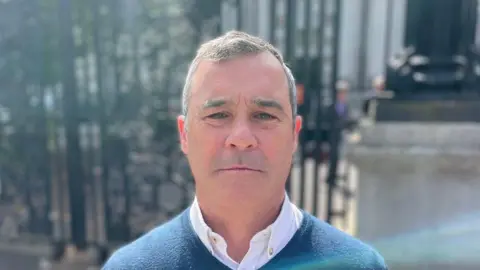
Gavin Booth from Phoenix Law represents several of the families. He said the legal process up until this point had not been working.
"This process does not deliver for families," he said.
"The judge is frustrated at having to list these cases and constantly try and get them dealt with.
"But unfortunately we're not at a stage where these can be dealt with as quickly as they can.
"We think that something needs to be done to change this, and we think that everybody is willing to come to the table, and we should find a progressive way to deal with these cases."
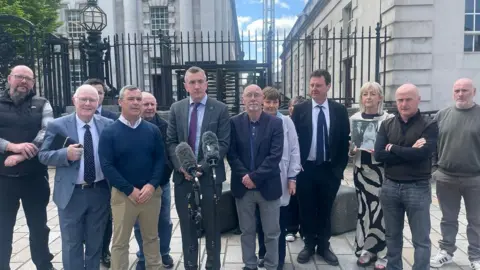
Who were the Glennane gang?
The Glenanne gang were members of the loyalist paramilitary group the Ulster Volunteer Force (UVF).
The gang was based at a farm in Glenanne, County Armagh, in the 1970s.
The gang's members are believed to have been responsible for up to 120 murders in nearly 90 attacks in the Troubles.
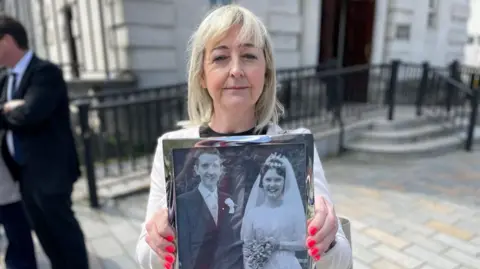
Legacy funding 'needs sorted'
It comes as the PSNI Chief Constable expressed frustration that his attempts to secure more funding for Troubles legacy issues have led to a stalemate between Westminster and Stormont over who pays for it.
Jon Boutcher described the financial and operational burden on his organisation as "significant and ongoing".
He and other senior PSNI personnel appeared before the Policing Board on Thursday.
"This needs sorted; we need everyone working around the table to resolve legacy to allow society to move forward," he said.
"When I raise it with the secretary of state, I'm told it's a devolved matter for the Northern Ireland Executive and the Department of Justice (DOJ).
"When I raise it with the executive and DOJ they see it understandably as a matter for Westminster."
The Secretary of State Hilary Benn has repeatedly said it is up to Stormont's executive to sort out in its annual budget, while ministers argue that their departments would not be able to find enough money.
Jon Boutcher also criticised the Labour government's general approach to legacy, saying it "falls far short" of what is required.
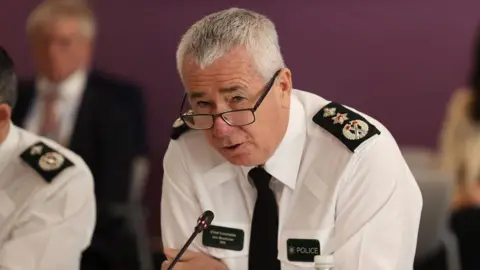 PA Media
PA MediaThe government has repeatedly committed to repeal and replace the controversial legacy act, brought in by the last Conservative government, which aimed to end most civil cases and inquests.
However, it has said it will not scrap the Independent Commission for Reconciliation and Information Recovery, which is the new body that investigates Troubles killings.
Some victims have questioned the independence of the body after a court ruling found the government had too much veto power over what material investigators could release.
Boutcher said that without a plan that is victim-focused and full resources to deal with civil cases and the potential resumption of inquests, the PSNI would face "decades of these cases meandering through the courts".
He added that sensitive material research being conducted by the PSNI on all Troubles legacy cases bar the Omagh Bombing inquiry was paused recently as a consequence of the unprecedented operational pressures.
However, he added that there are ongoing discussions with legal firms representing victims to resolve existing delays and manage the costly legal process.
"We've worked hard with stakeholders and courts, and the judiciary to prevent that incredibly challenging decision from impacting on wider court cases," said Boutcher.
